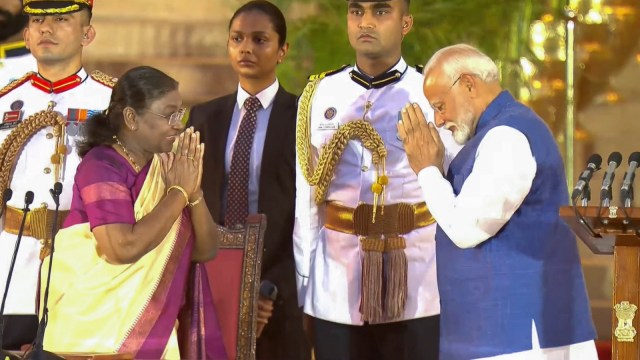
Dear Readers
The swearing in of a new government brings hope and anticipation — some trepidation as well. When a change of government is not necessarily a regime change, the expectation is that the unattained tasks of the past will be accomplished, new initiatives will be undertaken, and the successes will be consolidated. It also brings apprehensions that past mistakes might be repeated. Expectations of people in the country have naturally been raised – as also their fears that things might go wrong – because Prime Minister Narendra Modi has repeatedly underlined that the goal in the next two decades is to make India into a developed nation, ‘Viksit Bharat’.
The social and economic challenges before this endeavour are immense. Three decades of economic liberalisation has led to a rise in people’s aspirations. In the past 10 years, the programmes of the Modi government have acknowledged this reality but the task of building infrastructure, creating new jobs and equipping people with skills – and upgrading them – has only just begun.
The rural lag
There is now a wealth of data to suggest that the Indian economy is growing at a pace faster than most large global economies. However, the data also has a worrying facet – the rural economy is not keeping in step with the growth in other sectors. It’s still to overcome the injuries inflicted by the Covid pandemic. Weather vagaries of recent years, many of which are a fallout of climate change, have adversely affected real incomes in the country’s villages.
The Narendra Modi government’s emphasis on infrastructure has been a welcome mitigating factor. Good roads, for instance, mean that young people can commute relatively easily for education, even when a school is not near their homes; farmers can travel to markets many kms away. However, the increasing reliance on MGNREGA schemes – the data indicates that far more people are dependent on the programme compared to the pre-Covid days — is an indicator that much more needs to be done to restore the rural economy’s health. That a normal monsoon still holds the key to the economy’s fortunes is not reassuring in times of climate change.
The skill divide
The country faces a difficult paradox. Agriculture employs the greatest share of its labour force. At the same, as several studies show, an increasing number of young people do not find farming attractive. But where do they go to meet their aspirations, even when they are educated? In recent years, several studies have underlined the growing disconnect between India’s educational outcomes and market demands. The All India Council of Technical Education’s latest report, for instance, shows that more than 50 per cent of the country’s youth lack employability skills. Migrations end up feeding the gig and informal economies whose frailties were brutally underscored during the Covid pandemic.
The problem is compounded by the diverse socio-economic inequalities – those who lack social capital as well as access to quality education and training struggle to find a footing in the job market. At the same time, a large section of the relatively-advantaged spend their growing years in rote learning or in coaching schools that do precious little to enhance their faculties.
Coalition dharma
It’s not that in the past 10 years, the Narendra Modi hasn’t invested in the knowledge and skill economy. However, much remains to be done to ensure that the young in India have the skills to match market demands.
The much talked about boost to the manufacturing ecosystem is still in the works. It would be futile to argue whether the country’s skill deficit hobbles innovation in this sector or the small industry’s failure to take-off has meant that skilling has not received the desired fillip. Instead of getting bogged down in this chicken and egg debate, the new government would do well to spend its energies to tackle both aspects of the problem.
At the same time, it must also modernise agriculture, update it technologically and lift its sustainability quotient. That might require taking hard decisions. The Narendra Modi government’s past experience – especially with the farm laws – shows the fallacy of pushing down major changes without taking everyone on board. The dependence on coalition partners shouldn’t make Narendra Modi 3.0 reform averse. Securing the acceptance of all might not always be easy. Experience, however, shows that adhering to coalition dharma makes reform more sustainable. The Narendra Modi government’s challenge would be adhering to this dharma.
As usual, we will keep holding it to account.
Till next time
Kaushik Das Gupta
Click here for real-time updates on the Lok Sabha Election Results 2024


